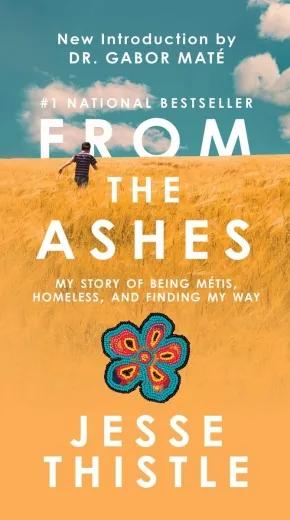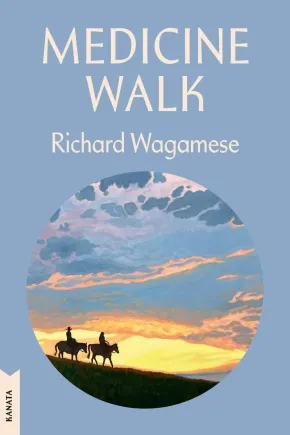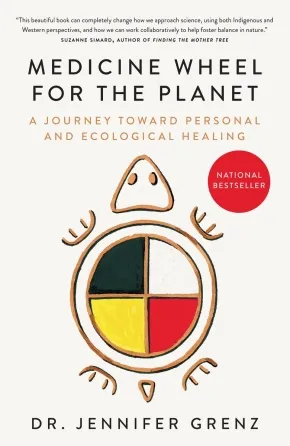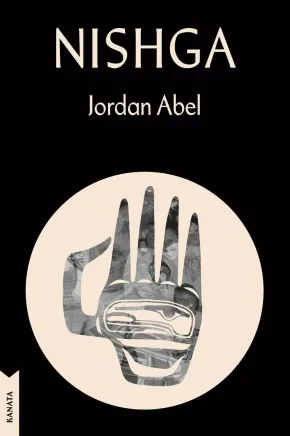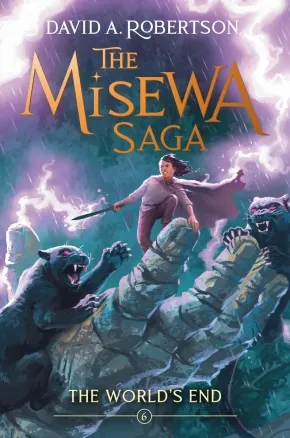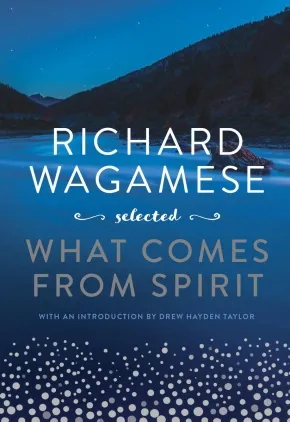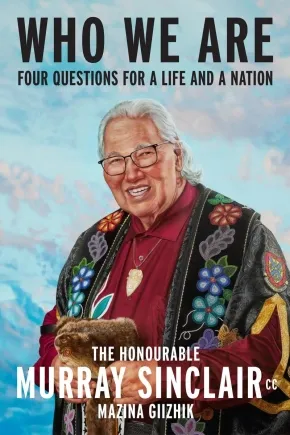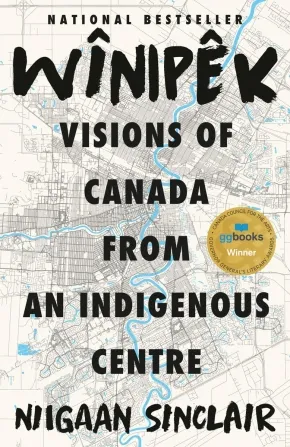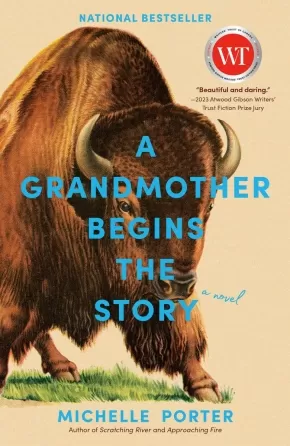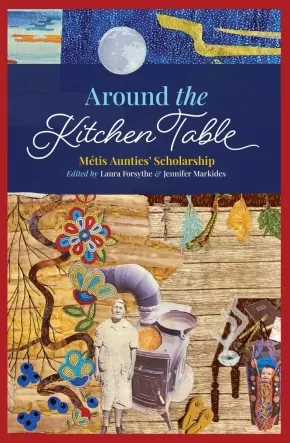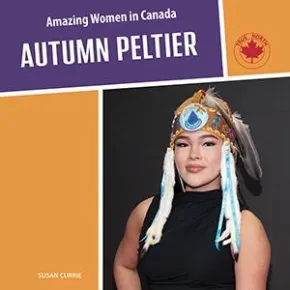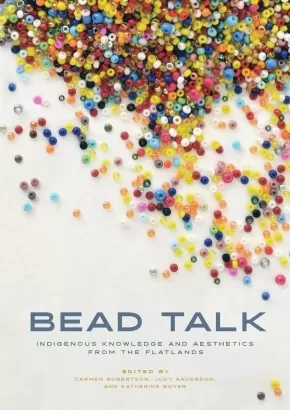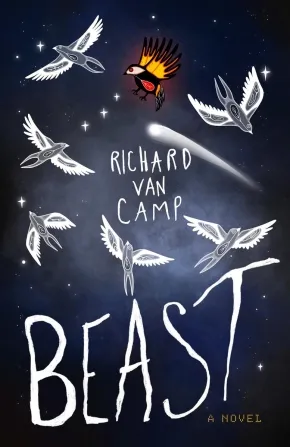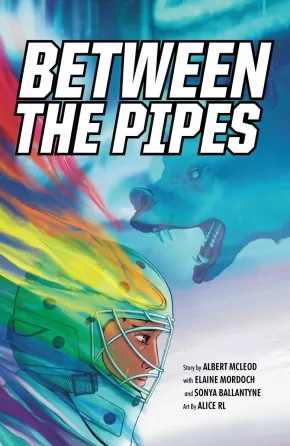
First Nation Communities Read
1
-
15
of
326 Results;
Sort By
Go To
of 22
First Nation Communities Read is an annual reading program launched in 2003 by the First Nations public library community in Ontario. First Nation Communities Read selected and other recommended titles:
- encourage family literacy, intergenerational storytelling, and intergenerational information sharing;
- are written and/or illustrated by, or otherwise involve the participation of a First Nation, Métis, or Inuit creator;
- contain First Nation, Métis, or Inuit content produced with the support of First Nation, Métis, or Inuit advisers/consultants or First Nation, Métis, or Inuit endorsement.
To view the children's and adult selections, visit:
First Nation Communities Read - Children's Selections
First Nation Communities Read - Adult Selections
- encourage family literacy, intergenerational storytelling, and intergenerational information sharing;
- are written and/or illustrated by, or otherwise involve the participation of a First Nation, Métis, or Inuit creator;
- contain First Nation, Métis, or Inuit content produced with the support of First Nation, Métis, or Inuit advisers/consultants or First Nation, Métis, or Inuit endorsement.
To view the children's and adult selections, visit:
First Nation Communities Read - Children's Selections
First Nation Communities Read - Adult Selections
From the Ashes: My Story of Being Métis, Homeless, and Finding My Way (PB)
$13.99
Format: Paperback
Text Content Territories:
Indigenous Canadian; First Nations; Cree (Nehiyawak); Métis;
Reading Level: N/A
ISBN / Barcode: 9781668213728
Synopsis:
Synopsis:
In this extraordinary and inspiring debut memoir, Jesse Thistle, once a high school dropout and now a rising Indigenous scholar, chronicles his life on the streets and how he overcame trauma and addiction to discover the truth about who he is.
If I can just make it to the next minute... then I might have a chance to live; I might have a chance to be something more than just a struggling crackhead.
From the Ashes is a remarkable memoir about hope and resilience, and a revelatory look into the life of a Métis-Cree man who refused to give up.
Abandoned by his parents as a toddler, Jesse Thistle briefly found himself in the foster-care system with his two brothers, cut off from all they had known. Eventually the children landed in the home of their paternal grandparents, but their tough-love attitudes meant conflicts became commonplace. And the ghost of Jesse’s drug-addicted father haunted the halls of the house and the memories of every family member. Struggling, Jesse succumbed to a self-destructive cycle of drug and alcohol addiction and petty crime, spending more than a decade on and off the streets, often homeless. One day, he finally realized he would die unless he turned his life around.
In this heartwarming and heartbreaking memoir, Jesse Thistle writes honestly and fearlessly about his painful experiences with abuse, uncovering the truth about his parents, and how he found his way back into the circle of his Indigenous culture and family through education.
An eloquent exploration of what it means to live in a world surrounded by prejudice and racism and to be cast adrift, From the Ashes is, in the end, about how love and support can help one find happiness despite the odds.
Awards
- 2020 Indigenous Voices Awards Winner for Published Prose in English
- Winner, Kobo Emerging Writer Prize Nonfiction
- Winner, High Plains Book Awards
- An Indigo Book of the Year
Reviews
“From the Ashes hits you like a punch in the gut. It’s an unflinching, heartrending and beautifully written story of survival against seemingly impossible odds. But it’s also a book that should make you furious. Thistle paints a vivid portrait of a country seemingly incapable of doing right by Indigenous youth or by those struggling with homelessness, addiction and intergenerational trauma. That he survived to tell this story is truly a miracle. Still, one question haunts me after finishing this powerful and devastating book: How do we ensure that the next generation isn’t forced to navigate a broken system that takes their lives for granted and fails them at every turn? My greatest hope, then, is that From the Ashes will be the wakeup call Canada needs.” — IAN MOSBY, historian and author of Food Will Win the War
Educator Information
Caution: Deals with mature subject matter.
Additional Information
368 pages | 6.00" x 9.00"
Medicine Walk: Kanata Classics Edition
$22.00
Format: Paperback
Text Content Territories:
Indigenous Canadian; First Nations; Anishinaabeg; Ojibway;
ISBN / Barcode: 9780771023521
Synopsis:
Synopsis:
By the celebrated author of Canada Reads Finalist Indian Horse, a stunning new novel that has all the timeless qualities of a classic, as it tells the universal story of a father/son struggle in a fresh, utterly memorable way, set in dramatic landscape of the BC Interior. For male and female readers equally, for readers of Cormac McCarthy, Thomas King, Russell Banks, and general literary.
Franklin Starlight is called to visit his father, Eldon. He's sixteen years old and has had the most fleeting of relationships with the man. The rare moments they've shared haunt and trouble Frank, but he answers the call, a son's duty to a father. He finds Eldon decimated after years of drinking, dying of liver failure in a small town flophouse. Eldon asks his son to take him into the mountains, so he may be buried in the traditional Ojibway manner.
What ensues is a journey through the rugged and beautiful backcountry, and a journey into the past, as the two men push forward to Eldon's end. From a poverty-stricken childhood, to the Korean War, and later the derelict houses of mill towns, Eldon relates both the desolate moments of his life and a time of redemption and love and in doing so offers Frank a history he has never known, the father he has never had, and a connection to himself he never expected.
A novel about love, friendship, courage, and the idea that the land has within it powers of healing, Medicine Walk reveals the ultimate goodness of its characters and offers a deeply moving and redemptive conclusion.
Wagamese's writing soars and his insight and compassion are matched by his gift of communicating these to the reader.
Reviews
“In Medicine Walk, Wagamese manages the nuances of betrayal and redemption with uncommon artistry. It is a breathtaking novel of sorrow, hope and polished steel.” – Thomas King
“A deeply felt and profoundly moving novel, written in the kind of sure, clear prose that brings to mind the work of the great North American masters; Steinbeck among them. But Wagamese's voice and vision are also completely his own, as is the important and powerful story he has to tell.” – Jane Urquhart
“Medicine Walk recounts the mythic journey of an estranged father and son who are searching for reconciliation and love. Richard Wagamese’s novel renders the Canadian wilderness with staggering insight and beauty. The same can be said for his understanding of the fragility, wildness and resilience of the human heart. Magnificent.” – Lisa Moore
“Medicine Walk is a masterpiece, a work of art that explores human interconnectedness with a level of artistry so superb that the personal becomes eternal.” – National Post
“A moving story…. Wagamese balances the novel’s spiritual and political subtexts with sly humour, sharp, believable dialogue and superb storytelling skills. Medicine Walk is a major accomplishment from an author who has become one of Canada’s best novelists.” – Toronto Star
“This is very much a novel about the role of stories in our lives, those we tell ourselves about ourselves and those we agree to live by…. Wagamese understands that the stories we don’t tell are as important as the ones we do….But Medicine Walk is also testament to the redemptive power of love and compassion.” – Globe and Mail
“One of the finest novels of the year…. Medicine Walk is not only a graceful book, it is a novel of grace, of coming to terms with hidden truths, of coming to know the secrets behind forbidding appearances, of finding the humanity within strangers.” – Vancouver Sun
“An essential read…. Superbly written.” – Now Magazine (NNNN)
Educator & Series Information
This edition of Medicine Walk is part of the Kanata Classics series, which celebrates timeless books that reflect the rich and diverse range of voices in Canadian literature.
Grades 10-12 BC English First Peoples resource for units on Childhood, Place-Conscious Learning, and Family.
Additional Information
256 pages | 5.50" x 8.25" | Paperback
Medicine Wheel for the Planet: A Journey toward Personal and Ecological Healing (PB)
$23.00
Format: Paperback
Text Content Territories:
Indigenous Canadian; First Nations; Salish; Interior Salish; Nlaka'pamux (Thompson);
Reading Level: N/A
ISBN / Barcode: 9781039006034
Synopsis:
Synopsis:
"This beautiful book can completely change how we approach science, using both Indigenous and Western perspectives, and how we can work collaboratively to help foster balance in nature." —Suzanne Simard, bestselling author of Finding the Mother Tree
For readers of Braiding Sweetgrass: Future-saving insights and approaches to science and ecology using both Indigenous and Western perspectives.
A farm kid at heart, and a Nlaka'pamux woman of mixed ancestry, Dr. Jennifer Grenz always felt a deep connection to the land. However, after nearly two decades of working as a restoration ecologist in the Pacific Northwest, she became frustrated that despite the best efforts of her colleagues and numerous volunteers, they weren't making the meaningful change needed for plant, animal and human communities to adapt to a warming climate. Restoration ecology is grounded in an idea that we must return the natural world to an untouched, pristine state, placing humans in a godlike role—a notion at odds with Indigenous histories of purposeful, reciprocal interaction with the environment. This disconnect sent Dr. Grenz on a personal journey of joining her head (Western science) and her heart (Indigenous worldview) to find a truer path toward ecological healing.
In Medicine Wheel for the Planet, building on sacred stories, field observations and her own journey, Dr. Grenz invites readers to share in the teachings of the four directions of the medicine wheel: the North, which draws upon the knowledge and wisdom of elders; the East, where we let go of colonial narratives and see with fresh eyes; the South, where we apply new-old worldviews to envision a way forward; and the West, where a relational approach to land reconciliation is realized.
Eloquent, inspiring and disruptive, Medicine Wheel for the Planet circles toward an argument that we need more than a singular worldview to protect the planet and make the significant changes we are running out of time for.
Reviews
"Grenz shares her ancestral Nlaka'pamux wisdom that respect, relationship and reciprocity with all life is essential in healing the land. In telling her stories, she demonstrates how these fundamental principles underlie the good work. She also teaches us that our ability to understand nature and our success at stewardship requires that we lead with our hearts and keep our beginner’s curiosity open. When we do this, we have unlimited capacity to heal. This beautiful book can completely change how we approach science, using both Indigenous and Western perspectives, and how we can work collaboratively to help foster balance in nature.” —Suzanne Simard, author of Finding the Mother Tree: Discovering the Wisdom of the Forest
“Rooted in both Indigenous and Western ways of understanding and doing science, Medicine Wheel for the Planet challenges the simplistic, dichotomous thinking that has led well-meaning environmentalists astray for too long. In a book that is part primer in ecology, part memoir, and part manifesto, Jennifer Grenz movingly shares her own process of learning and unlearning, of connecting with traditional knowledge and practices to help unearth future-saving insights and approaches — and by doing so, generously invites the reader to undertake a similar transformation. Wise, humble, provocative, brave, and beautifully written, this book is a triumph. Read it and let it alter and expand how you see the world and your place and role within it." —Astra Taylor, author of The Age of Insecurity: Coming Together as Things Fall Apart
“Deeply moving and compelling, Medicine Wheel for the Planet weaves a powerful story about the limitations of restoration ecology and a Western lens, and illuminates a path forward using the power of Indigenous and reciprocal ways of being. An imperative read for all Canadians.” —Angela Sterritt, author of Unbroken: My Fight for Survival, Hope, and Justice for Indigenous Women and Girls
“In this thoughtful and heartfelt book, Dr. Grenz challenges us to reflect on how – despite the massive contributions of Western science – we humans are impacting the Earth and all life on our planet in problematic ways, most recently evident in the ongoing global climate crisis. Guiding us through the medicine wheel concept, she illuminates the deep experiences of the First Peoples, often conveyed through stories, that can inspire us to be better relatives, reminding us to focus our time and energy on healing the Earth. This is a revelatory, immersive work that illustrates, with respect and gratitude, the meaningful role that all systems of knowledge play in connecting ‘our heads and our hearts’ for a healthier planet.” —Nancy J. Turner, Distinguished Emeritus Professor in Environmental Studies, University of Victoria, author/editor of many books including The Earth’s Blanket, Member of the Order of Canada, the Order of British Columbia and winner of Canadian Botanical Association Lawson Medal
“Medicine Wheel for the Planet transported me gently into the dynamic world of plants and trees and offers a powerful viewing lens—one derived from Indigenous storytelling as well as from Western science. Dr. Grenz helped me to see research methods through a more holistic perspective, and skilfully shows what science could accomplish if untangled from the rigid rules of our dominant culture. With patience and humility, she convinced me that if we take the time to look and listen differently, the land will offer us crucial lessons in healing that would otherwise be left unseen and unheard.” —Dr. Jane Philpott, author of Health for All: A Doctor's Prescription for a Healthier Canada
Educator Information
This book is available in French: La roue de médecine: Un nouveau récit pour guérir la planète
Additional Information
280 pages | 5.18" x 8.00" | Paperback
Nishga: Kanata Classics Edition
$22.00
Format: Paperback
Text Content Territories:
Indigenous Canadian; First Nations; Nisga'a;
Reading Level: N/A
ISBN / Barcode: 9780771023491
Synopsis:
Synopsis:
Part of the inaugural Kanata Classics list, with a new introduction by David Chariandy, NISHGA is a groundbreaking, deeply personal, and devastating autobiographical meditation that attempts to address the complicated legacies of Canada’s residential school system and contemporary Indigenous existence.
As a Nisga'a writer, Jordan Abel often finds himself in a position where he is asked to explain his relationship to Nisga'a language, Nisga'a community, and Nisga'a cultural knowledge. However, as an intergenerational survivor of residential school--both of his grandparents attended the same residential school--his relationship to his own Indigenous identity is complicated to say the least.
NISHGA explores those complications and is invested in understanding how the colonial violence originating at the Coqualeetza Indian Residential School impacted his grandparents' generation, then his father's generation, and ultimately his own. The project is rooted in a desire to illuminate the realities of intergenerational survivors of residential school, but sheds light on Indigenous experiences that may not seem to be immediately (or inherently) Indigenous.
Drawing on autobiography and a series of interconnected documents (including pieces of memoir, transcriptions of talks, and photography), NISHGA is a book about confronting difficult truths and it is about how both Indigenous and non-Indigenous peoples engage with a history of colonial violence that is quite often rendered invisible.
Reviews
“With NISHGA, Jordan Abel has reinvented the memoir, incorporating personal anecdotes, archival footage, legal documentation, photos and concrete poetry to create an unforgettable portrait of an Indigenous artist trying to find his place in a world that insists Indigeneity can only ever be the things that he is not. Abel deftly shows us the devastating impact this gate-keeping has had on those who, through no decisions of their own, have been ripped from our communities and forced to claw their way back home, or to a semblance of home, often unassisted. This is a brave, vulnerable, brilliant work that will change the face of nonfiction, as well as the conversations around what constitutes Indigenous identity. It's a work I will return to again and again.” —Alicia Elliott, author of A Mind Spread Out on the Ground
“In NISHGA, Jordan Abel puts to use the documentary impulse that has already established him as an artist of inimitable methodological flair. By way of a mixture of testimonial vignettes, recordings of academic talks, found text/art, and visual art/concrete poetry, Abel sculpts a narrative of dislocation and self-examination that pressurizes received notions of “Canada” and “history” and “art” and “literature” and “belonging” and “forgiveness.” Yes, it is a book of that magnitude, of that enormity and power. By its Afterword, NISHGA adds up to a work of personal and national reckoning that is by turns heartbreaking and scathing.” —Billy-Ray Belcourt, author of NDN Coping Mechanisms and A History of My Brief Body
"This is a heart-shattering read, and will also be a blanket for others looking for home. NISHGA is a work of absolute courage and vulnerability. I am in complete awe of the sorrow here and the bravery. Mahsi cho, Jordan.” —Richard Van Camp, author of Moccasin Square Gardens
“Jordan Abel digs deeply into the questions we should all be asking. Questions that need no explanation but ones that require us to crawl back into our bones, back into the marrow of our understanding. NISHGA is a ceremony where we need to be silent. Where we need to listen.” —Gregory Scofield, author of Witness, I Am
Educator & Series Information
This edition of Nishga is part of the Kanata Classics series, which celebrates timeless books that reflect the rich and diverse range of voices in Canadian literature.
Additional Information
304 pages | 5.54" x 8.26" | Paperback
The World's End (HC)
$24.99
Format: Hardcover
Text Content Territories:
Indigenous Canadian; First Nations; Cree (Nehiyawak); Swampy Cree ;
ISBN / Barcode: 9781774883372
Synopsis:
Synopsis:
Eli must embrace his unique heritage and make an impossible decision about his future, and the future of Misewa, in this thrilling last adventure in the award-winning, Narnia-inspired Indigenous middle-grade fantasy series.
Eli, Morgan and Emily manage to free themselves from captivity as the battle between the humans, animal beings, and Bird Warriors rages on. But there's another, more personal battle, as Eli and an unlikely ally fight to save Mahihkan’s life through a previously forbidden portal. When the Sleeping Giant rumbles to life, the stakes hit an all-time high, and Eli has to reach deep within himself to summon the power so that he can protect Misewa against the dangers of colonization . . . forever.
Educator & Series Information
Recommended ages 10+.
This is Book 6 of the Misewa Saga. Narnia meets traditional Indigenous stories of the sky and constellations in this epic middle-grade fantasy series from award-winning author David Robertson.
Additional Information
280 pages | 5.50" x 8.25" | Hardcover
What Comes From Spirit: Richard Wagamese Selected (PB)
$19.95
Format: Paperback
Text Content Territories:
Indigenous Canadian; First Nations; Anishinaabeg; Ojibway; Wabaseemoong First Nation;
Reading Level: N/A
ISBN / Barcode: 9781771624602
Synopsis:
Synopsis:
A curated collection of Richard Wagamese’s short writings. Richard Wagamese, one of Canada’s most celebrated Indigenous authors and storytellers, was a writer of breathtaking honesty and inspiration. Always striving to be a better, stronger person, Wagamese shared his journey through writing, encouraging others to do the same. This curated collection of Wagamese’s non-fiction works, with an introduction by editor Drew Hayden Taylor, brings together more of the prolific author’s short writings, many for the first time in print, and celebrates his ability to inspire. Drawing from Wagamese’s essays and columns, along with preserved social media and blog posts, this beautifully designed volume is a tribute to Wagamese’s literary legacy.
Reviews
"Treasure these words. Honour his thoughts. But don’t read it too fast. Soak it in. Enjoy every morsel. Linger on each page because every paragraph has nuggets of understanding. Lines of wisdom. Stories to appreciate." — Drew Hayden Taylor
Additional Information
176 pages | 5.50" x 8.00" | Paperback
Who We Are: Four Questions For a Life and a Nation (PB)
$26.00
Format: Paperback
Text Content Territories:
Indigenous Canadian; First Nations; Anishinaabeg; Ojibway;
Reading Level: N/A
ISBN / Barcode: 9780771099137
Synopsis:
Synopsis:
Judge, senator, and activist. Father, grandfather, and friend. This is Murray Sinclair’s story—and the story of a nation—in his own words, an oral history that forgoes the trappings of the traditional written memoir to center Indigenous ways of knowledge and storytelling. As Canada moves forward into the future of reconciliation, one of its greatest leaders guides us to ask the most important and difficult question we can ask of ourselves: Who are we?
For decades, Senator Sinclair has fearlessly educated Canadians about the painful truths of our history. He was the first Indigenous judge in Manitoba, and only the second Indigenous judge in Canadian history. He was the Chair of the Truth and Reconciliation Commission, and remains one of the foremost voices on Reconciliation. And now, for the first time, he will share his full story—and his full vision for our nation—with readers across Canada.
Drawing on Senator Sinclair’s unique experiences, and his perspectives regarding Indigenous identity, human rights, and justice in Canada, Who We Are will examine the roles of history, resistance, and resilience in the pursuit of finding that path forward, and healing the damaged relationship between Indigenous Peoples and non-Indigenous peoples in Canada. And in doing so, it will reveal Senator Sinclair’s life in a new and direct way, exploring how all of these experiences shaped him as an Anishinaabe man, father, and grandfather.
Structured around the four questions that have long shaped Senator Sinclair’s thinking and worldview—Where do I come from? Where am I going? Why am I here? Who am I?—Who We Are will take readers into the story of his remarkable life as never before, while challenging them to embrace an inclusive vision for our shared future.
The book includes the What We Have Learned report, created by the Truth and Reconciliation Commission of Canada (TRC).
Reviews
“Who We Are is a very special, very important book. With deep humility, surprising humour, and abiding humanity—all the 'humes,' if you will—Murray Sinclair made me feel as though I was sitting beside him at a campfire, listening to stories and teachings from his most remarkable life. I could hear his voice. I could feel the fire. I could imagine a better world. But Murray Sinclair asks us to do more than imagine it. By sharing with unflinching honesty what shaped him as a visionary leader, he calls us to change the world, to make it better for each new generation, and to honour the sacredness of Creation. I will return to Who We Are again and again, for his stories, his soulful poems, and his guidance. This book, so much about understanding where we have come from, is a gift to where we are going.”—Shelagh Rogers, O.C., Chancellor of Queen’s University and Honorary Witness in the Truth and Reconciliation Commission
“It would be impossible to quantify Murray Sinclair’s impact on this place that we call Canada. He’s said that since education got us into this mess, education must get us out of it. If that’s true, and I believe it is, he is one of our most important teachers. The pursuit of reconciliation takes place on a long and winding road. It will take generations to reach our destination, but this book and Sinclair’s voice will stand the test of time, guiding us in his wisdom and the example he has set in how he has lived his life.”—David A. Robertson, bestselling author of the Misewa Saga Series
Additional Information
480 pages | 5.18" x 8.00" | Paperback
Wînipêk: Visions of Canada from an Indigenous Centre (PB)
$24.00
Format: Paperback
Text Content Territories:
Indigenous Canadian; First Nations; Anishinaabeg;
Reading Level: N/A
ISBN / Barcode: 9780771099199
Synopsis:
Synopsis:
From ground zero of this country's most important project: reconciliation
Niigaan Sinclair has been called provocative, revolutionary, and one of this country's most influential thinkers on the issues impacting Indigenous cultures, communities, and reconciliation in Canada. In his debut collection of stories, observations, and thoughts about Winnipeg, the place he calls "ground zero" of Canada's future, read about the complex history and contributions of this place alongside the radical solutions to injustice and violence found here, presenting solutions for a country that has forgotten principles of treaty and inclusivity. It is here, in the place where Canada began—where the land, water, people, and animals meet— that a path "from the centre" is happening for all to see.
At a crucial and fragile moment in Canada's long history with Indigenous peoples, one of our most essential writers begins at the centre, capturing a web spanning centuries of community, art, and resistance.
Based on years' worth of columns, Niigaan Sinclair delivers a defining essay collection on the resilience of Indigenous peoples. Here, we meet the creators, leaders, and everyday people preserving the beauty of their heritage one day at a time. But we also meet the ugliest side of colonialism, the Indian Act, and the communities who suffer most from its atrocities.
Sinclair uses the story of Winnipeg to illuminate the reality of Indigenous life all over what is called Canada. This is a book that demands change and celebrates those fighting for it, that reminds us of what must be reconciled and holds accountable those who must do the work. It's a book that reminds us of the power that comes from loving a place, even as that place is violently taken away from you, and the magic of fighting your way back to it.
Awards
- Winner of the 2024 Governor General's Literary Award for Nonfiction.
Additional Information
384 pages | 5.14" x 7.92" | b&w photos throughout | Paperback
A Grandmother Begins the Story: A Novel (PB)
$22.95
Format: Paperback
Text Content Territories:
Indigenous Canadian; Métis;
Reading Level: N/A
ISBN / Barcode: 9780735245396
Synopsis:
Synopsis:
Five generations of Métis women argue, dance, struggle, laugh, love, and tell the stories that will sing their family, and perhaps the land itself, into healing in this brilliantly original debut novel.
Carter is a young mother, recently separated. She is curious, angry, and on a quest to find out what the heritage she only learned of in her teens truly means.
Allie is trying to make up for the lost years with her first born, and to protect Carter from the hurt she herself suffered from her own mother.
Lucie wants the granddaughter she's never met to help her join her ancestors in the Afterlife.
Geneviève is determined to conquer her demons before the fire inside burns her up, with the help of the sister she lost but has never been without.
And Mamé, in the Afterlife, knows that all their stories began with her; she must find a way to loose herself from the last threads that keep her tethered to the living, just as they must find their own paths forward.
This extraordinary novel, told by a chorus of vividly realized, funny, wise, confused, struggling characters—including descendants of the bison that once freely roamed the land—heralds the arrival of a stunning new voice in literary fiction.
Additional Information
336 pages | 5.18" x 8.00" | Paperback
Around the Kitchen Table: Métis Aunties' Scholarship
$27.95
Editors:
Format: Paperback
Text Content Territories:
Indigenous Canadian; Métis;
Reading Level: N/A
ISBN / Barcode: 9781772840735
Synopsis:
Synopsis:
Honouring the scholarship of Métis matriarchs
While surveying the field of Indigenous studies, Laura Forsythe and Jennifer Markides recognized a critical need for not only a Métis-focused volume, but one focused on the contributions of Métis women. To address this need, they brought together work by new and established scholars, artists, storytellers, and community leaders that reflects the diversity of research created by Métis women as it is lived, considered, conceptualized, and re-imagined.
With writing by Emma LaRocque and other pioneers of Métis studies, Around the Kitchen Table looks beyond the patriarchy to document and celebrate the scholarship of Métis women. Focusing on experiences in post-secondary environments, this collection necessarily traverses a range of methodologies. Spanning disciplines of social work, education, history, health care, urban studies, sociology, archaeology, and governance, contributors bring their own stories to explorations of spirituality, material culture, colonialism, land-based education, sexuality, language, and representation. The result is an expansive, heartfelt, and accessible "community of Métis thought," as articulated by Markides.
Reverent and revelatory, this collection centres the strong aunties and grandmothers who have shaped Métis communities, culture, and identities with teachings shared in classrooms, auditoriums, and around the kitchen table.
Reviews
"Inspiring, healing, and future-facing, this long overdue book gives us valuable new insights into the histories and identities of Métis people." — Kim Anderson
"Around the Kitchen Table is an exciting and thought-provoking contribution to the fields of Métis Studies and Indigenous feminism. Reading this book is like sitting down to visit with a strong cup of tea and your favourite aunties. It will inspire readers to think about matriarchy in new and exciting ways, teaching us what it means to be Métis women, good relatives, and innovative scholars." — Cheryl Troupe
Educator Information
Other contributors: Jennifer Adese, Christi Belcourt, Hannah Bouvier, Rita Bouvier, Vicki Bouvier, Robline Davey, Leah Marie Dorion, Marilyn Dumont, Nicki Ferland, Chantal Fiola, Lucy Fowler, Chelsea Gabel, Janice Cindy Gaudet, Emily Haines, Shalene Jobin, Emma LaRocque, Amanda LaVallee, Lynn Lavallee, Avery Letendre, Kirsten Lindquist, Yvonne Poitras Pratt, Angela Rancourt, Lisa Shepherd, Allyson Stevenson, Kisha Supernant, Caroline Tait, Angie Tucker, Dawn Wambold
Table of Contents
Contributors
Foreword by Caroline Tait
The Work of Métis Women: An Introduction – Jennifer Markides
Part One: Identity
1. Brown Names – Marilyn Dumont
2. We Know Ourselves – Lisa Shepherd
3. Kaa-waakohtoochik: The Ones Who Are Related to Each Other – Vicki Bouvier
4. The Roots Always Remain: Reconnecting to Our Communities in the Twenty-First Century – Angie Tucker
5. For the Love of Place―Not Just Any Place: Selected Metis Writings – Emma Larocque
6. Coming Home through Métis Research – Allyson Stevenson
7. Valuing Métis Identity in the Prairies through a “5 R” Lens: Our Digital Storytelling Journey – Chelsea Gabel and Amanda LaVallee
8. Prenatal/Postpartum Ceremonies and Parenting as Michif Self-Determination – Chantal Fiola
9. Medicine Women – Jennifer Adese
10. Lii Michif – Lisa Shepherd
Part Two: Women in the Academy
11. Metis Women as Contributors to the Academy Despite Colonial Patriarchy – Laura Forsythe
12. Connecting to Our Ancestors Through Archaeology: Stories of Three Métis Women Academics – Kisha Supernant, Dawn Wambold, and Emily Haines
13. Métis Women Educating in the Academy – Yvonne Poitras Pratt and Jennifer Markides
14. Structural and Lateral Violence Toward Metis Women in the Academy – Lynn Lavallee
Part Three: Research Methodology
15. Métis Research and Relationality: Auntie Governance, the Visiting Way, and Kitchen Table Reflections – Kirsten Lindquist, Shalene Jobin, Avery Letendre
16. Lii Taab di Faam Michif/Metis Women’s Kitchen Table: Practicing Our Sovereignty – Cindy Gaudet and Angela Rancourt
17. Wahkotowin: An Approach to Indigenous (Land-Based) Education – Nicki Ferland
18. Kaa-natoonamaan taanshi chi-ishi-natoonikeeyaan: My Search for how to Research Things (in a Queer Métis paradigm) – Lucy Fowler
19. Differentiating Métis Feminism – Robline Davey
20. Celebrating the Wisdom of Our Métis Matriarchs: Sewing Our Wellness All Together—Kood Toot Aansamb – Leah Dorion, Janice Cindy Gaudet, Hannah Bouvier
21. if the land could speak – Rita Bouvier
Bibliography
Art – Christi Belcourt
Additional Information
200 pages | 6.00" x 9.00" | index, bibliography | Paperback
Autumn Peltier
$15.95
Format: Paperback
Text Content Territories:
Indigenous Canadian; First Nations; Anishinaabeg; Wiikwemkoong Unceded Territory;
ISBN / Barcode: 9781774566718
Synopsis:
Synopsis:
Only 19 years old, Autumn Peltier has achieved so much by advocating for her community. Discover more about her advocacy for Indigenous peoples and clean water.
Reviews
"Autumn Peltier tells the inspiring story of a young Indigenous woman who has devoted her life to protecting water and advocating for clean, safe water on reserves across Canada. Her great-aunt, Josephine Mandamin, was a respected water protector and served as the Chief Water Commissioner for the Anishinabek Nation. Inspired by her aunt, Autumn recognized the importance of water at a young age and, at just 13 years old, addressed the United Nations for the first time. When Josephine passed away, Autumn—only 15 years old—was named the new Chief Water Commissioner. As a young Indigenous leader, Autumn Peltier is a powerful role model who continues to make a meaningful impact. This book would make an excellent read-aloud in the classroom." - Debra H., Elementary School Teacher, Indigenous Books for Schools
Educator Information
Juvenile Nonfiction.
This book is included in the Indigenous Books for Schools database from the Association of Book Publishers of BC. It is recommended for Grades 4 to 8 for Social Studies, Science, Physical and Health Education, and Career Education.
Additional Information
24 Pages
Bead Talk: Indigenous Knowledge and Aesthetics from the Flatlands
$27.95
Format: Paperback
Text Content Territories:
Indigenous Canadian; First Nations; Métis;
Reading Level: N/A
ISBN / Barcode: 9781772840650
Synopsis:
Synopsis:
Sewing new understandings.
Indigenous beadwork has taken the art world by storm, but it is still sometimes misunderstood as static, anthropological artifact. Today’s prairie artists defy this categorization, demonstrating how beads tell stories and reclaim cultural identity. Whether artists seek out and share techniques through YouTube videos or in-person gatherings, beading fosters traditional methods of teaching and learning and enables intergenerational transmissions of pattern and skill.
In Bead Talk, editors Carmen Robertson, Judy Anderson, and Katherine Boyer gather conversations, interviews, essays, and full-colour reproductions of beadwork from expert and emerging artists, academics, and curators to illustrate the importance of beading in contemporary Indigenous arts. Taken together, the book poses and responds to philosophical questions about beading on the prairies: How do the practices and processes of beading embody reciprocity, respect, and storytelling? How is beading related to Indigenous ways of knowing? How does beading help individuals reconnect with the land? Why do we bead?
Showcasing beaded tumplines, text, masks, regalia, and more, Bead Talk emphasizes that there is no one way to engage with this art. The contributors to this collection invite us all into the beading circle as they reshape how beads are understood and stitch together generations of artists.
Reviews
“An evocative, aesthetically gorgeous book that is rich in knowledge, relationality, and experience. Curated with care, rooted in artistic practice and lived experience, and embodying a polyvocal, collaborative spirit, it immerses the reader in the world of Indigenous beadwork on the prairies. Bead Talk carries teachings about decolonial love, healing and medicine, cultural knowledges, political and theoretical modes of action, gendered experience, and more. I can’t think of any other book like this—it is a gift!” — Aubrey Hanson
Educator Information
Contributors: Ruth Cuthand, Dayna Danger, Sherry Farrell Racette, Marcy Friesen, Felicia Gay, Franchesca [Fran] Hebert-Spence, Audie Murray, Cathy Mattes.
Table of Contents
Foreword – Brenda Macdougall
Who We Are
Introduction – Carmen Robertson, Judy Anderson, and Katherine Boyer
Part I: Conversations
1. Mentoring/Beading – Ruth Cuthand and Marcy Friesen
2. mîkisistahêwin (bead medicine) – Judy Anderson and Audie Murray
3. Parallel Lines Move Along Together: A Beaded Line that Connects Me to You – Katherine Boyer and Dayna Danger
4. The Power of Gathering: Revisiting the Seeds of Ziigimineshin – Franchesca Hebert-Spence and Carmen Robertson
5. Beads, Blood, and Curating Ruth Cuthand’s Art – Felicia Gay and Carmen Robertson
Part II: Essays
6. “Until We Bead Again”: The BU Beading Babe and Embodying Lateral Love and Generous Reciprocity – Cathy Mattes
7. Visiting Kin: Indigenous Flatland Beading Aesthetics – Carmen Robertson
8. If the Needles Don’t Break and the Thread Doesn’t Tangle: Beading Utopia – Sherry Farrell Racette
Afterword: Spreading the Bead Love Far and Wide
Additional Information
240 pages | 6.00" x 8.50" | 62 colour illustrations | Paperback
Beast: A Novel
$24.95
Format: Paperback
Text Content Territories:
Indigenous Canadian; First Nations; Dene; Denesuline (Chipewyan); Tlicho (Dogrib); Cree (Nehiyawak); Métis;
ISBN / Barcode: 9781771624145
Synopsis:
Synopsis:
Returning to his favourite setting of Fort Simmer, Northwest Territories, Richard Van Camp brings his exuberant style to a captivating teen novel that blends the supernatural with 1980s-era nostalgia to reflect on friendship, tradition and forgiveness.
For as long as Lawson can remember, his life in a small Northwest Territories town has revolved around “the Treaty” between the Dogrib and the Chipewyan, set down centuries ago to prevent the return of bloody warfare between the two peoples.
On the Dogrib side, Lawson and his family have done their best to keep the pact alive with the neighbouring Cranes, a family with ancestral ties to a revered Chipewyan war chief. But even as Lawson and his father dutifully tidy the Cranes’ property as an act of respect, their counterparts offer little more than scowls and derision in return, despite the fact that both families are responsible for protecting the treaty.
Worse still, it seems that one of the Cranes’ boys is doing all he can to revive the old conflict: Silver, fresh out of jail, has placed himself in the service of a cruel, ghoulish spirit bent on destroying the peace. Now it's up to Isaiah Valentine, a Cree Grass Dancer, Shari Burns, a Metis psychic, and Lawson Sauron, a Dogrib Yabati—or protector—to face what Silver Cranes has called back.
This latest feat of storytelling magic by celebrated author Richard Van Camp blends sharply observed realism and hair-raising horror as it plays out against a 1980s-era backdrop replete with Platinum Blonde songs and episodes of Degrassi Junior High. Unfolding in the fictional town of Fort Simmer—the setting of previous Van Camp stories—Beast delivers a gripping, spirited tale that pits the powers of tradition against the pull of a vengeful past.
Reviews
"Beast opens conversations about culture, traditions, and supernatural beings, allowing us to understand the importance of community, finding our purpose/gifts, and supporting one another in community. Beast covers topics such as grief, intention setting, and the importance of culture and traditions in Indigenous communities." - Shaniah H., K-12 Teacher, Indigenous Books for Schools
Educator Information
Young adult fiction.
This book is included in the Indigenous Books for Schools database from the Association of Book Publishers of BC. It is recommended for Grades 8 to 12 for English Language Arts.
Content Warning: Violence, fighting, horror, and suspense.
Additional Information
312 pages | 5.50" x 8.50" | Paperback
Becoming a Matriarch (PB)
$23.00
Format: Paperback
Text Content Territories:
Indigenous Canadian; First Nations; Dene; Dane-zaa (Dunne-za);
Reading Level: N/A
ISBN / Barcode: 9780385697798
Synopsis:
Synopsis:
When matriarchs begin to disappear, there is a choice to either step into the places they left behind, or to craft a new space.
Helen Knott’s bestselling debut memoir, In My Own Moccasins, wowed reviewers, award juries, and readers alike with its profoundly honest and moving account of addiction, intergenerational trauma, resilience, and survival. Now, with her highly anticipated second book, Knott exceeds the highest of expectations with a chronicle of grief, love, and legacy. Having lost both her mom and grandmother in just over six months, forced to navigate the fine lines between matriarchy, martyrdom, and codependency, Knott realizes she must let go, not just of them, but of who she thought she was.
Woven into the pages are themes of mourning, sobriety through loss, and generational dreaming. Becoming a Matriarch is charted with poetic insights, sass, humour, and heart, taking the reader over the rivers and mountains of Dane Zaa territory in Northeastern British Columbia, along the cobbled streets of Antigua, Guatemala, and straight to the heart of what matriarchy truly means. This is a journey through pain, on the way to becoming.
Through writing, reflecting, and dreaming I found my way to the real lessons.
I found permission to become whoever I needed to be.
I found permission to live a life and not just endure it.
I found permission to belong deeply to myself.
I found permission to lay to rest the sorrow of the women before me and to cultivate joy for us in its place.
Awards
- 2024 BC Book Awards - The George Ryga Award for Social Awareness in Literature winner
Reviews
“In enchantingly vivid language and with a compelling narrative arc, Helen Knott’s new masterpiece is a memoir of grief and joy, loss and rediscovery, flight and return and, above all, a paean to the beautiful, eternal, soothing and all-encompassing power of matriarchy.” —Gabor Maté MD, author of The Myth of Normal: Trauma, Illness and Healing in a Toxic Culture
“Knott lays out that which all Indigenous women know and feel on a cellular level—we are only here because of the women, the matriarchs, the warriors, the survivors, the courageous ones, the fierce ones, the loving ones who came before us. Beautifully, tenderly Knott maps out for the reader the intrinsic way Indigenous women lift up, celebrate and support one another. Even when no one else does. We always have each other. We see each other. We are each other’s medicine. And there is no greater gift. These are the stories Indigenous women must tell—the journeys, reclamation and place of matriarchs. Present in Knott’s words are paths to reconciliation for everyone.” —Nahanni Fontaine, Member of the Legislative Assembly of Manitoba
“Becoming a Matriarch is a vivid, lyrical exploration of womanhood, loss, grief, and eventually, self-love, braided together with radiance and wisdom. Knott brilliantly uses memory as a tool for self-exploration and growth. The land, dreams and body are in constant communication: ‘My body knows the mountains and rivers and berry bushes that it comes from.’ Throughout the book you can’t help but ask yourself, what does it mean to come from strong women and still allow yourself space to be loved? Becoming a Matriarch teaches us that joy can exist inside the cracks of the most tumultuous times in our lives and love can still bloom if we let it.” —Chelene Knight, author of Dear Current Occupant and Junie
“Becoming a Matriarch is a feast of remarkable, colourful, deep and profoundly raw storytelling. Helen Knott is one of the greatest Indigenous literary artists of our time.” —Brandi Morin, author of Our Voice of Fire: A Memoir of a Warrior Rising
Additional Information
224 pages | 5.18" x 8.00" | Paperback
Between the Pipes
$21.95
Artists:
Format: Paperback
Text Content Territories:
Indigenous Canadian; First Nations; Cree (Nehiyawak);
ISBN / Barcode: 9781774921043
Synopsis:
Synopsis:
In this engrossing graphic novel, teen hockey player Chase learns more about himself and his identity in the face of prejudice and homophobia.
Thirteen-year-old Chase’s life and identity should be simple. He’s the goalie for his hockey team, the Eagles. He’s a friend to Kevin and Jade. He's Kookum's youngest grandchild. He’s a boy. He should like girls.
But it’s not that simple. Chase doesn’t like girls the way that the other boys do. It’s scary being so different from his peers. Scarier still is the feeling that his teammates can tell who he is—and that they hate him for it. If he pretends hard enough, maybe he can hide the truth.
Real strength and change can’t come from a place of shame. Chase’s dreams are troubled by visions of a bear spirit, and the more he tries to hide, the more everything falls apart. With the help of an Elder, and a Two-Spirit mentor, can Chase find the strength to be proud of who he is?
Between the Pipes explores toxic masculinity in hockey through the experiences of an Indigenous teen.
Reviews
“Highlights the importance of community and cultural connection as roots for embracing one’s identity.” — Kirkus Reviews
“The authors deftly confront multiple layers of intolerance exacerbated by toxic masculinity. Ojibwe artist RL uses saturated full color (with well-placed, empowering rainbows) to capture Chase’s self-empowering journey. The result is a compelling, hope-giving antidote against potential at-risk suicide among 2-Spirit/Indigenous LGBTQQIA+ youth.” — Booklist
“This hopeful...story offers valuable insight into Chase’s experience as a gay, Indigenous teen. Hockey and identity collide in this affirming graphic novel about recognizing and valuing one’s authentic self.” — School Library Journal
Educator Information
Recommended for ages 12 - 18.
Reading Level: Fountas & Pinnell Y
This book is included in the Indigenous Books for Schools database from the Association of Book Publishers of BC. It is recommended for Grades 6 to 9 for Career Education, English Language Arts, Physical and Health Education, and Social Studies.
Caution: Bullying and homophobia.
Additional Information
56 pages | 6.50" x 10.00" | Paperback
Sort By
Go To
of 22

